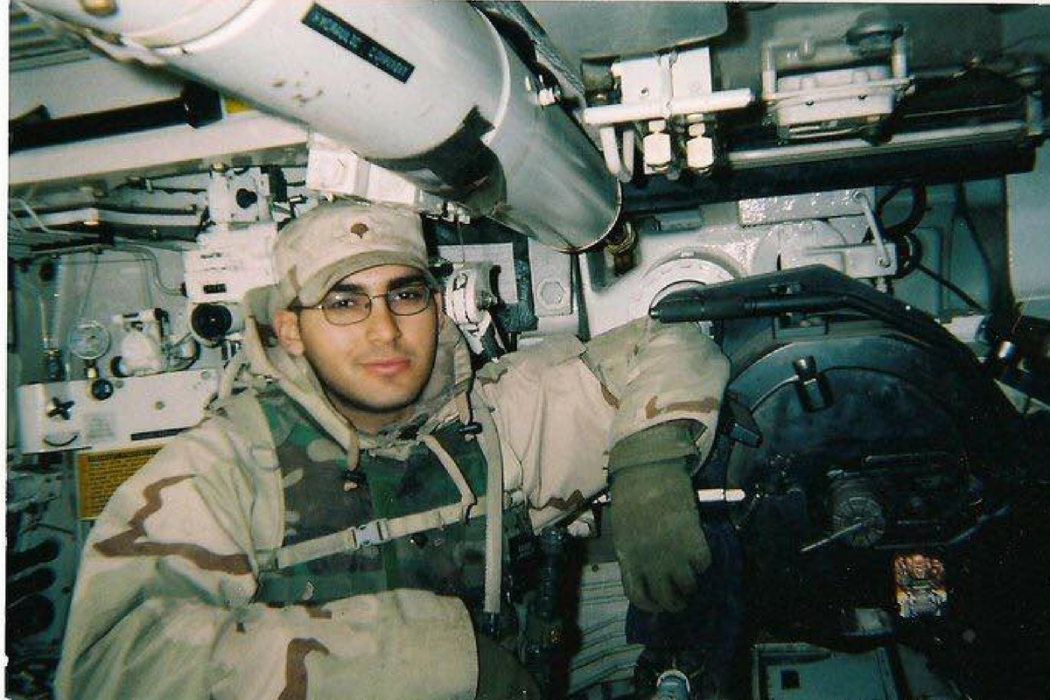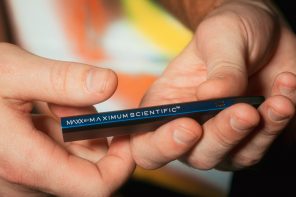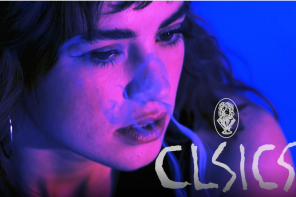In a week he’ll never forget, combat veteran Jose Belen took the federal government to court for the right to use medical cannabis, which enables him to live a normal life with Post-Traumatic Stress Disorder. The cannabis industry can serve veterans by employing them, Belen said, and he’s starting a company to educate cannabis businesses on veterans’ needs.
Belen, who served in the U.S. Army during the Iraq War, and four other plaintiffs who rely on medical cannabis, are suing Attorney General Jeff Sessions alleging that the Controlled Substances Act classification of marijuana as an illegal drug is unconstitutional. After hearing their stories in court on Feb. 14 in New York, Judge Alvin Hellerstein said: “You can’t say the plaintiffs’ lives have not been changed by marijuana.”
The next court date has yet to be set, but Belen said the judge’s statement gave him a glimmer of hope. “He can still turn around and say this isn’t the place it needs to be heard. We’re hoping he rules swiftly, pushes us to the second circuit if needed. We’ll go to the supreme court if needed,” Belen said, adding that even if the case goes to the Supreme Court and fails, he’s only 35 and would be more than happy to try again.
A local of Orlando, Florida, Belen’s part in the lawsuit is to champion for veterans’ right to use cannabis for mental health and suicide prevention on behalf of Mission Zero, which he founded with his wife Danielle Belen to combat the PTSD and veteran suicide epidemic.
“When it comes to suicide, civilians will have a plan. With veterans, it’s just – gun’s right there, boom. We’ve shot firearms, we know the fatalities, and the pain can end right now. There’s a veteran committing suicide every 90 minutes. The longer the politicians and the government decide to go back and forth until there’s a solution, well, if it takes you a year – you lost 8,000 veterans to suicide,” Belen said.
Belen talked about the historic case, and how the cannabis industry can serve veterans, with Cashinbis.
Have you spoken to President Trump or Attorney General Jeff Sessions directly?
Donald Trump can put an executive order in and call it a day. That’s why I put in so many calls to have a conversation with him. I haven’t talked to him yet. I’m trying to make as much noise as possible. The conversation would be very simple. We’ve lost more veterans to suicide than we damn did in Vietnam. Twenty-two veterans commit suicide every day. Sir, what are you going to do for the 22nd veteran today, who commits suicide? The 22nd veteran tomorrow? We need to do something today and look at prevention. If he says no to me, he’s saying no to every veteran in this country, and he can’t spin it as fake news.
It’s a very simple request on behalf of honorable women and men who are taking their lives because of prohibition. He’s walking around saying veterans this and veterans that. Well, I’m the veteran who’s going to hold him accountable if I have to.
Same thing with Jeff Sessions. I’ll tell him the same thing. I’ve never spoken to him directly. I’m praying. I looked right in the cameras with all the media last Wednesday, and I said, Jeff Sessions, if you have a heart beating in your chest, use it. Even if you don’t believe in cannabis, hate it, call it devil’s lettuce, whatever your belief is – Please understand there are people who need it to save their lives and to function.
If you don’t believe in it, at least believe in your veterans. These men and women of honor aren’t going to make unreasonable requests – we don’t ask for anything, pity or sorrow. I would look Jeff Sessions in the eye without one ounce of fear and boldly say, you know you’re wrong. If I took your legal pills, it would cause me to kill myself. I pray for that court day when I can tell him that.
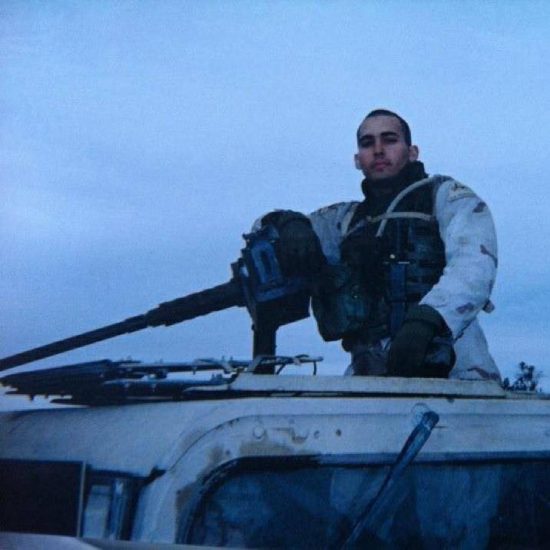
Jose Belen in Iraq, 2003 (Credit Jose Belen)
What has it been like being part of a historic lawsuit?
I always admired civil rights activists. For me, as a man, as a veteran, it’s everything. I love nothing more than I helped someone today. And Wednesday, just the sheer voice and message, hope has been given. It’s been extremely overwhelming, but extremely well received by me. My goal Wednesday was when I did my speech to start the morning with a veteran rally. Then I said my next goal is to get to the next platform – a White House invitation if I can.
I feel like we’re unstoppable. I have no idea how the government would try to silence me. We’re getting our message out at a global level.
How can the cannabis industry cater to veterans’ needs?
If prohibition’s over, guess who will walk through your door, and guess who you can hire?
More employment opportunities – veterans are not a liability. We’re an asset. By being properly medicated and thinking clearly, veterans who are not in the workforce can apply to jobs because their thoughts won’t be, “I’m ending my life today.” Once that thinking is clear, veterans will be more welcome in the workforce. They won’t be walking around feeling like zombies.
Veterans struggling financially will be able to perform better and take off the stress of providing for their family instead of drinking all the time because they’re afraid to go to the black market.
I’m an entrepreneur, a veteranpreneur. This will give credence to those who felt they could never achieve this level of success and jump into entrepreneurship and get veterans behind them. This is all about empowering the veterans, and their success will impact the business world.
Have a sticker on the window: Veterans Welcome. Offer discounts for veterans. Training for staff – veterans sometimes don’t want to talk. Know how to interact with them so they feel valued. Once you do that you’ll have veterans saying “Hey Tommy, this is the most veteran-friendly dispensary in the area.”
What can cannabis businesses do now so that in full legalization, we’ll be one step ahead?
My company The Sky Is Not The Limit, is rolling out education for C-Level executives on how they can humanize veterans at their companies, their veteran workforce, and make them comfortable. We’ve written a curriculum.
We already have a dispensary that we’re working with directly, engaging their staff in how to work with veterans, or how to treat them when they walk through the door. There’s 175,000 veterans coming out [of service] every year – the data we’ve collected shows there’s an immense number of those on unemployment. That’s where they become lethargic. That’s where the PTSD explodes. The first 6-12 months are critical. That’s why companies – take Verizon for example. Verizon has an amazing veterans’ initiative.
Have subject matter experts come sit on the board of your corporation. Contract us out. Veterans feel safe with other veterans. If veterans feel their fundamental needs are met by an employer, that they accept that we’re disabled but see us as enabled – that gives veterans the best quality of life.
If you have a strong IT background or consulting background, contact us at The Sky Is Not The Limit. My vision is that this will be a publicly traded company with 100 percent staffing of veterans where we can implement the true leadership we learned in the military. Our leadership in the workforce is perfect. We’re already primed for it. We have investors – there are some beautiful things coming.
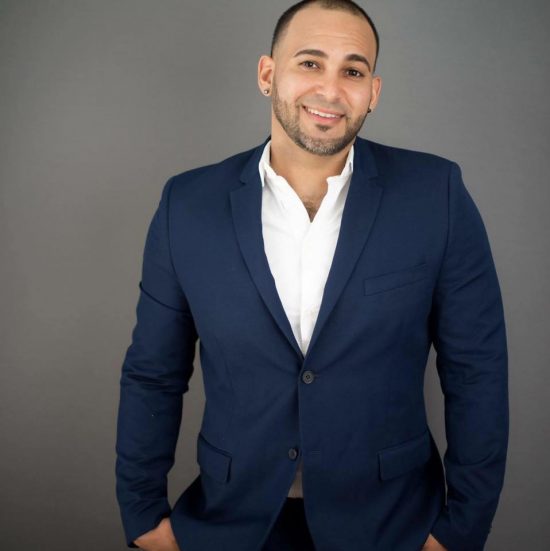
(Credit Summer Star)
What is the work of Mission Zero?
Veterans don’t talk to anyone about their deepest and rawest of emotions – but we talk to each other. We have 75,000 veterans here in central Florida alone. Most of those veterans and introverted.
My wife and I put a local meet-up group together for veterans that are struggling with PTSD, that are struggling with suicidal thoughts. Low and behold, we had a significant response with the very first meeting we put out there – we actually saved a veteran. I got a text from a veteran brother in Orlando that a veteran was close to suicide. And the V.A. Closes at 5:30 – so this guy, all he had was: call 911, commit suicide, OR, there’s a community of brotherhood and sisterhood at this location he can come to right now. Guess what? We got him there, he was a Desert Storm veteran in a troubled state. But as soon as a veteran comes in the door, their guard is down because this is a closed group – no cell phones or photos. By the end, he left with tears in his eyes and the precedent was set. If you’re at that point again, call Jose Belen, we’ll be there for you.
Now we have the city’s support, so we’re spearheading that this year. I sit on two boards: The Mayor of Orlando’s Veterans Advisory Council, and Orange County’s. I have a meeting tomorrow with the council board chairman to create systems for veterans in Orlando – put 5ks together to get families out and the community to rally behind the veterans. We want to honor families that have been affected by a veterans’ suicide, locally.
We’re losing an average of 22 veterans a day, but there’s no tracking. We don’t know who that veteran will be. We need to look at the system. We’re working on an app with a leading technology company, and this app would come right in there from a suicide prevention standpoint in determining what strain this veteran needs of cannabis. Whatever situation they have with cannabis, the doctors would be tied in. A real-time app that has an algorithm so that as soon as the veteran comes into an app, there’s a survey asking three to five simple questions: where are you today? Based on their responses, if there’s a word in there that’s troubling, it gets identified so we’re able to see if a veteran is somewhat critical. From there, it will send a push notification to myself or a physician. We’re still in beta testing but we’re getting into the technology.
We’re looking to do a cross-country tour with Mission Zero, going to universities and working with current programs for PTSD. Those are a few initiatives we’re working on right now.
How does it affect you to talk to other veterans in this troubled state, and how do you find the strength to help them?
It’s not about me. It has zero to do with Jose Belen. When I went to combat, I put on my heart, every single American country without knowing their name and I was willing to die for each and every one of them. And I meant it then. The mindset for me is no different now. Whatever I have to sacrifice, whether it’s my emotional or psychological state, I put myself through it because it matters so much. Their life matters to me.
It does affect me, I do break down in tears. I had a mother call me here locally whose son committed suicide six days after Veterans Day this past year. He only lived 20 minutes from me. I feel in a sense like I failed him – if he’d seen a Mission Zero speech, found a flyer, he might have had one last bit of hope. It’s necessary for that mother to feel like she didn’t lose her son in vain. There’s a Suicide Awareness Walk Day, and my wife and I did this walk with her, cried with her, and I embraced her during the National Anthem. Because, all in all, this mother lost her only son.
It does affect me mentally, but I’m built for this.
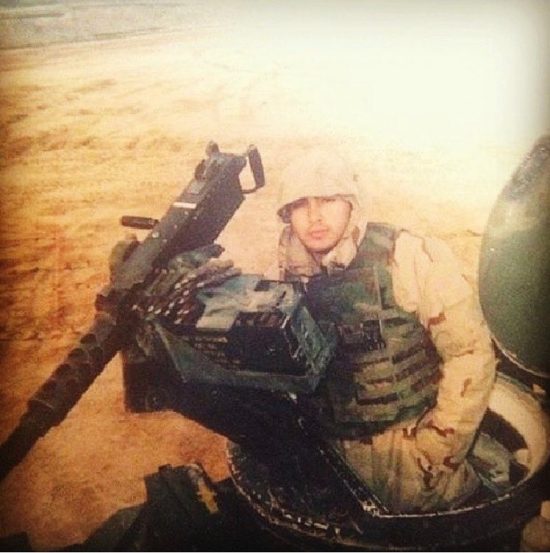
Jose Belen Iraq, 2003 (Credit Jose Belen)
What kind of medical cannabis products do you use?
My preference is TruLeaf – I’m here in Florida. It really depends on my day. PTSD doesn’t go away. Once you get to the point of suicide, you can’t ever undo that. But the suicidal thoughts – once you use cannabis, those are immediately blocked. It’s suppressed because you don’t feel like that. My depression and PTSD, I’m very hard on myself. I don’t give myself credit or if there’s a bump in the road, I beat myself up. But I vape and it allows me to feel normal. It’s medicine.
What has been your experience with the Department of Veterans Affairs when it comes to medical cannabis?
My doctor will talk to me, they encourage communication on it, but it’s like dangling the carrot in front of you. We can talk about it, but what does that do? We already know it helps. It’s a stick in the mud. That’s the current protocol with the VA — we encourage veterans to talk to us about it. What does that do? We don’t have anything to say other than, ‘I feel great.’
The cannabis issue is scaring veterans away from the VA, and if we’re able to address it, we can get them back in there and back in touch with other resources.
How has medical cannabis improved the quality of life for you and your family?
I can smile again. I didn’t know what it was to even feel love. There was a coldness that followed me leaving Iraq because there, I became someone else. It’s primal – you seek and destroy the enemy and kill them. When you accept that, and proudly, and you come out [of service], you’re at this place morally like: Am I a killer?
It really has turned around. My poor wife and kids – I would ruin the most beautiful of days. We could be driving to the beach with not a cloud in the sky, and I’d be pissed off for no reason, with mood swings. Those days are gone. I found the smile that I had as a 19-year-old optimist before combat. I can sleep. I can share, embrace and understand what that warmth is. I appreciate Christmas. In combat, there was no Christmas. You detach from all that – no Monday, no happy hour Friday. Cannabis has allowed me to function as a human being the way I was always meant to be.
What was your experience like getting a medical cannabis card?
It’s frustrating. My account is locked right now because of a photo issue with my card – then you can’t buy products even though they know you have a qualifying condition. Your prescription runs out every seven months, which they never told me on my first visit. The provisions they have made it a frustrating process.
The cost is the biggest barrier to entry. It’s $100-150 for a doctor’s visit. It’s $60-70 per vaporizer cartridge. When you’re working with limited income and limited transportation, the cost factor became the biggest challenge for me. Plus, there’s a 90-day backlog to even be seen, and then 30 days to get your card.
Veterans can reach out to Mission Zero – we trail-blazed the path for this so we have a path to resources in general. When it comes to medical cannabis, we can direct them immediately. It’s not ‘go to Google and figure it out,’ it’s life-saving, so reach out to us.
What do you think about medical cannabis patients not being allowed to have firearms?
I think it’s B.S. You’d rather not have a vet carry a firearm when they’re on pills. I willingly gave my firearms to my wife – I have a license to conceal carry – I gave them to my wife because when you’re on these pills, you’re walking around like the incredible hulk.
When you’re using cannabis, it’s the opposite – you’re thinking clearly. Taking away a veteran’s second amendment rights because they need to use cannabis is ludicrous. I have to surrender my firearm to use cannabis to potentially save my life, but then I can’t save my family’s life if something is happening. It all comes down to responsibility, as well. If you think you’ll do something stupid, do what I did.
Veterans are reading your story in the news and asking, how can we help support you?
The most important thing right now is continuing the awareness that veterans have the power to change society’s vision of us. Society doesn’t know us, and they have this perception of us. It’s them, too, going on social media and showing what we look like, who we are. Those who are at the point of suicide, getting them out there. As far as advocacy, send us an email. Let us know how you want to support us, and how we can support you.
At the end of the day, this is a national issue. From Florida where I’m based to Seattle, Washington – my brothers and sisters, we can rise up in a peaceful, articulate manner.
Once we have our veterans together again, we’re empowered under Mission Zero. Everyone can immediately get involved on social media. If anyone wants to be Mission Zero ambassadors, they’re welcome to join our story. What you can do in your local community – go to the local VFW and say, hey brothers, there’s a mission going on right now, for us and by us for Mission Zero. Assemble veterans together to go to the local courts, go to the capital, and spearhead this issue. Veteran suicide and how cannabis is pivotal to this will never be respected if we don’t make the necessary moves.
If you want to financially support Mission Zero, you’re not supporting Jose Belen, you’re actually supporting the veterans and their right to compassionate access to cannabis. We need to feel engaged together because as soon as we step out of the military, we feel broken because we’re losing contact with men and women who we would take a bullet for – and we mean that. So this is a way to get re-engaged, come together as a chain and continue to impact one life at a time. This is getting the families involved because it’s not a singular issue with veterans. The repercussion of a veteran’s suicide or a veteran struggling with PTSD is affecting the silent victims – their wife and child. Even if you can’t join us boots on the ground in Florida, you can join us across the country.

